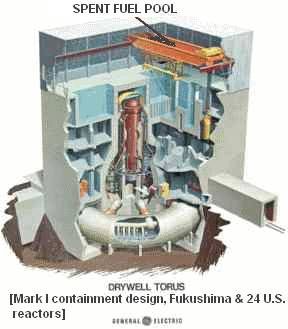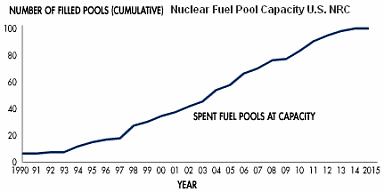The Chairman of the United States Nuclear Regulatory Commission (NRC), Gregory Jaczko, told a US House of Representatives subcommittee that: "There is no water in the spent fuel pool [at the Fukushia I plant] and we believe that radiation levels are extremely high, which could possibly impact the ability to take corrective measures." A "utility spokesman" for Tokyo Electric responded quickly claiming that the "condition is stable." AP, March 17
The New York Times, China's Peoples Daily, and other outlets covered this extraordinary asymmetrical exchange between the highest nuclear regulatory official in the US government and a "utility spokesman." (Image)
The public disagreement between two close allies in the midst of a
severe crisis is highly instructive on a number of levels. If chair
Jaczko wrong, it is a terrible embarrassment for the US. If he's right,
we can conclude that much of the information from Tokyo Electric is
questionable.
![]()
The nuclear disaster at Fukushima I is a complex event. Logical
progressions are difficult to grasp and follow, particularly when the
United States and Japan disagree so fundamentally at the highest
levels.
Concerns about human loss and suffering are paramount. Information on that is also challenging. One theme from the start has been, this is not another Chernobyl. As failures continue and risks become apparent, the comparison to Chernobyl is less important than the risks to the 103 million Japanese on Honshu Island and those in surrounding nations. The best scenario advanced for a major release of toxic elements from the Fukushima I plant involves winds taking the danger west to the Pacific Ocean.
Guenther Oettinger, Commissioner of Energy for the European Union (EU) issued an ominous statement just hours ago:
"The site
is effectively out of control," Guenther Oettinger, commissioner for
energy, told a European Parliament committee. "In the coming hours there
could be further catastrophic events which could pose a threat to the
lives of people on the island." Dow Jones, March 20
EU Energy Chief Oettinger warns of worsening nuclear catastrophe in Japan (subtitled)
Ottinger went on to say that information from Japanese government sources was contradictory and that he had an information network beyond just official statements from Tokyo.
When the top US nuclear official and the commissioner of energy for the EU make major hedges on the worsening events in Japan, it's time to take notice.
The Larger Issue
In the midst of all this, it is important to pose the question that may have prevented this disaster and changed the world's energy future. Is nuclear energy an acceptable source of power?
The issue of fuel rod storage combined with the initial regulatory approach to the dangers of nuclear power plants can help answer the question.
The spent fuel pool consists of spent nuclear fuel rods that are stored in the Fukushima reactors (and other GE reactors with a similar design) after they have outlived their usefulness. They're placed in the pool of water designed to maintain the rods in a safe state. The storage needs will exceed capacity in the US by 2015.
Take a look at the image above of the reactor design at Fukushima (and 23 nuclear reactors in the US) and ask this question. Does this make any sense? The spent fuel rods, pilled up in the fuel pool, are above the reactor vessel and active fuel rods. If there is a meltdown or an explosion of sufficient quantity, toxic elements from both the reactor and the fuel pools may breach the containment structure and enter the atmosphere. Why create a design that compounds the most serious problem, the meltdown, with additional toxic emissions? Don't nuclear regulators understand the concept of a reasonableness test?
(Note: You can view every article as one long page if you sign up as an Advocate Member, or higher).






